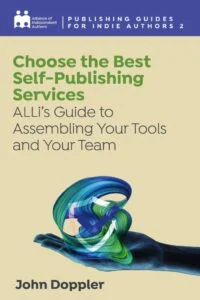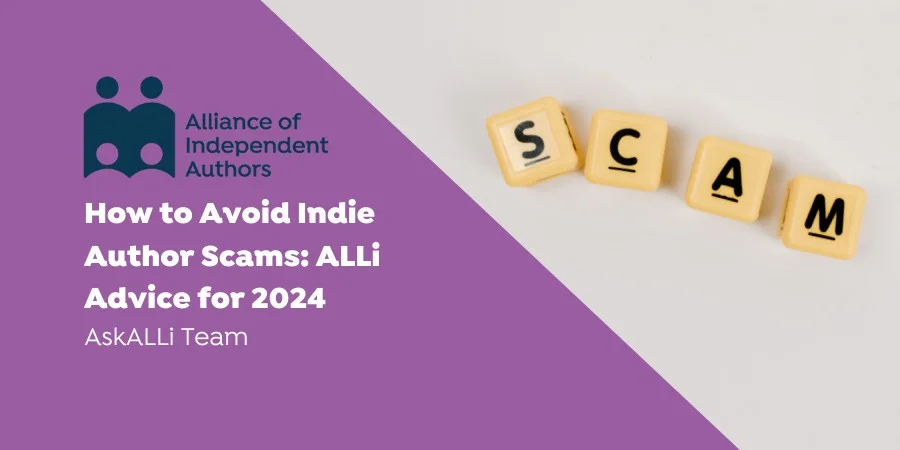At the Alliance of Independent Authors we hear on a daily basis from our members and the wider community about the fantastic successes and opportunities offered by the indie-author life. However, along with the good can come the bad. One growing challenge we face today is identifying indie author scams that can result in loss of earnings, loss of rights, and loss of confidence.
We have recently been made aware of scam emails even coming from accounts appearing to be from the Alliance of Independent Authors – more detailed information on that will be coming soon. But with a cautious approach and the correct information you can identify and avoid author scams to keep yourself and your work safe.
Indie author scams in 2024

ALLi's Watchdog John Doppler
John Doppler, who heads up the ALLi Watchdog Desk, has collected together eight of the top scams we've been seeing this year. These have been selected because we hear of them often or because we can see they are growing in recent months. Read on to find out what to watch out for, and spread the word amongst our indie-author community:
1. Literary agent scams
Literary agent scams are still one of the most common schemes preying on indie authors. Authors are approached by a supposed literary agent who either states that a major publisher is interested in their work, or who offers to shop a manuscript around to industry professionals using their vast array of insider contacts. That's generally followed by a solicitation for fees, or the author is funnelled to a vanity press for screenwriting or editing services.
Sometimes, the scammer will impersonate a real literary agent.
As tempting as this may be, the truth is that no legitimate literary agent trawls the internet looking for clients. And no agent will demand payment in advance for services. That's just not how things are done in the industry.

Photo by Jose P. Ortiz on Unsplash
2. Film studio impersonators
Similar to the literary agent scams, scammers have begun impersonating film studios, fraudulently claiming to represent a well-known studio and expressing interest in the author's work. When the author responds, a solicitation for a “small investment” inevitably follows: screenplay formatting, editing, or nonspecific fees for “agent representation”.
What distinguishes this scam from the literary agent fraud above is that we are now seeing these scammers creating convincing, lookalike websites for defunct studios or studios which do not maintain a presence on the web. For example, Adam Sandler's production company, Happy Madison Productions, does not maintain a public website. Scammers seized on that opportunity to create an impersonation site, happymadisoninc-dot-com, and even created a Facebook page linking to that site.
Even for savvy authors who verify the sender's email address to ensure it comes from a trusted source, the subterfuge can be convincing enough to slip past their defenses.
We have heard of these style of indie author scams growing in recent months with one ALLi member, Ann Richardson, sharing her story:

Ann Richardson
I had a very convincing email from what purported to be the senior production executive of a named film company wanting to make a documentary based on my book, Life in a Hospice. (This is a book about the nature of hospice care, as described in the words of the doctors, nurses and others who work in hospice care.)
The ‘subject’ line of the email directly referenced the book, saying: “We think Life in a Hospice is amazing! We want to work with you!!!”. He wrote that they were “on the lookout for captivating books” with the potential to become a documentary film and suggested my book would “translate beautifully onto the screen.” They and “some of our investors” wished to discuss this to work out the terms of a possible collaboration and contract. He explained that as he understood that this was a big decision and there might be questions, he would be happy to address these before moving forward.
Of course, I was immediately concerned it was a scam, but noted that it was a very professional approach and a little voice – the inveterate optimist – was asking “what if…?”
To check legitimacy, I first searched with Google. The documentary film company named not only existed but was associated with a well-known movie studio, which made it seem more serious.
I continued looking, but unfortunately, further investigation found that this film company had gone out of business in 2005 and there was no evidence of any working company with this name.
Scam approaches can be very convincing, but make sure you do your own in depth research before responding to any offer.
Ann Richardson has written more about this experience and her reactions here.
3. Review bombing extortion
This year, ALLi's Watchdog Desk has seen an uptick in extortion scams, in which an anonymous party threatens to leave negative reviews on an author's books or somehow have their books removed from sale if they don't pay a fee.
We have not seen any instances of the criminals actually carrying out these threats. Nonetheless, this can be a stressful and even terrifying intrusion into an author's livelihood.
Authors who receive such threats should report them to the authorities. Do not engage with the sender in any way, and never send the attacker money or financial information to “make the problem go away”. The harassment will only escalate if you respond.
4. “Local” publishing services
When evaluating a publisher or assisted publishing service, it's a good idea to examine their listed address carefully. Many claim to be “local' but on closer examination are not.
Manhattan, Chicago, Los Angeles, London, and other metropolitan areas are common locations claimed by vanity press scams. But searching for the address on Google Maps will usually reveal that it's a rented maildrop in a shipping store or virtual office. The real perpetrators may be thousands of miles away, well outside of the reach of your regional law enforcement if the service you buy is sub-standard or doesn't exist.
One of the most common locations for low-quality or fraudulent author services we are seeing right now is the Philippines, where an Author Solutions-inspired industry has taken root and thrives.
Be wary of any company that misrepresents its location.
5. Amazon “partner” scams
 Amazon has filed suit against a number of vanity press scams who claimed to be affiliated with KDP or Amazon. These prolific scammers churn out a flood of websites with “Amazon” or “Kindle” in their domain names. But despite their claims of special partnerships with the retail giant, they have no connection to Amazon or its self-publishing or traditional publishing divisions.
Amazon has filed suit against a number of vanity press scams who claimed to be affiliated with KDP or Amazon. These prolific scammers churn out a flood of websites with “Amazon” or “Kindle” in their domain names. But despite their claims of special partnerships with the retail giant, they have no connection to Amazon or its self-publishing or traditional publishing divisions.
These scams provide grossly substandard services at astronomical fees, or they may simply vanish into the night with the author's money. Remember, Amazon does not charge indie authors to publish their books on their platform and will not get in touch to offer you this service.
6. “Paid” interviews
A junk marketing service that's been making the rounds is the paid interview. These interviews on podcasts, radio, or videos require the author to either pay the interviewer, or pay a middleman who arranges the interview.
Interviews like these are rarely cost-effective, even when they're legitimate. And increasingly, scammers have taken to collecting payment for high-profile shows which they have no connection to.
7. AI-assisted plagiarism
Criminals of all kinds were quick to seize on the potential of generative AI. These tools turn a scam that once had a fairly low and risky rate of success into an automated factory for plagiarized works, making piracy and plagiarism possible on a scale we've never seen before.
Criminals are using AI to paraphrase authors' books entirely. These sloppy, inelegant knock-offs differ from the source text enough to evade copyright protections and automated screening algorithms. And because copyright protects the expression of an idea and not the ideas themselves, it may be difficult to persuade online platforms to remove the stolen work.
Until a reliable means of detecting AI-generated text is developed, this scam remains an existential threat to authors' discoverability and sales.
8. ‘Phishing' emails targeting indie authors
Increasingly, indie authors are running their author activity as a small businesses, and are therefore attractive to scammers looking to gain access to financial or other information. Small business usually have less sophisticated IT security infrastructure than their bigger counterparts and this can make them easy targets for scammers sending ‘phishing' emails posing as a bank or other trusted institution.
ALLi recommends indie authors pay careful attention to each and every email received, particularly those that include a link or a request for data. Always stop and think when a request is made. Get in the habit of reading the sender email address in full and looking for obvious red flags such as misspelled domains. Details in the email ‘From' line can also appear to be from one person or organization, but when you click on the details another address is visible.
If an email requests an action via clicking a link, do not click. Instead, visit the official website of the organisation to verify that the action is truly needed. And avoid sharing confidential information through email unless you verify the sender and can encrypt the data. We also advise to never send money through Western Union or cryptocurrencies.
What to look out for in a scam email appearing to be from the Alliance of Independent Authors?
This is a good time to remind all our members that ALLi would never send emails on behalf of a third party requesting your information, and would never request personal data in an email, such as ID information or bank details.
If you receive any emails claiming to be from ALLi requesting personal information, do not click on links or provide any sensitive information. Instead, report the email to us immediately: Contact ALLi to Report a Scam
The ALLi Watchdog Desk
 ALLi's Watchdog Desk monitors the self-publishing industry in a variety of ways as part of our ongoing Ethical Self-Publishing Campaign. We have a Code of Standards for ethical authors and ethical services.
ALLi's Watchdog Desk monitors the self-publishing industry in a variety of ways as part of our ongoing Ethical Self-Publishing Campaign. We have a Code of Standards for ethical authors and ethical services.
ALLi members have access to range of support to identify ethical suppliers and watch out for scams and rogue traders. Those who are not members can purchase some of the support guidance on the ALLi website. Just four of the support services on offer from the watchdog desk are outlined below:
- Partner Membership: This is our highest rating for services (see below), awarded to approved self-publishing services. Author members access these partners through our Partner Search database and they and the wider community through a widely distributed Directory of approved services.
- Directory of Services: Members can access this Directory here (member log in needed) and the wider community can purchase the directory in our Self-Publishing Advice Center Shop.
- Guidebook: Choosing The Best Self-Publishing Services, our comprehensive guide to the industry. Members: see the Guidebooks page (log-in needed). Non-members can purchase a copy here
- Services Ratings: As an outreach service to the community, we rate good and bad services on the Services Ratings page in our Self-Publishing Advice Center.
PLEASE NOTE: The ALLi ratings are the opinion of the Watchdog Desk. Ratings are based on careful appraisals of multiple criteria, including pricing and value, quality of service, contract terms and rights, transparency, accountability, and customer satisfaction.
ALLi members can contact the Watchdog Desk at any time if you would like to inform us about a service, or discuss a rating.
Thoughts or further questions on this post or any self-publishing issue?
If you’re an ALLi member, head over to the SelfPubConnect forum for support from our experienced community of indie authors, advisors, and team. Simply create an account (if you haven’t already) to request to join the forum and get going.
Non-members looking for more information can search our extensive archive of blog posts and podcast episodes packed with tips and advice at ALLi's Self-Publishing Advice Center.
And if you haven’t already, we invite you to join our organization and become a self-publishing ally.





